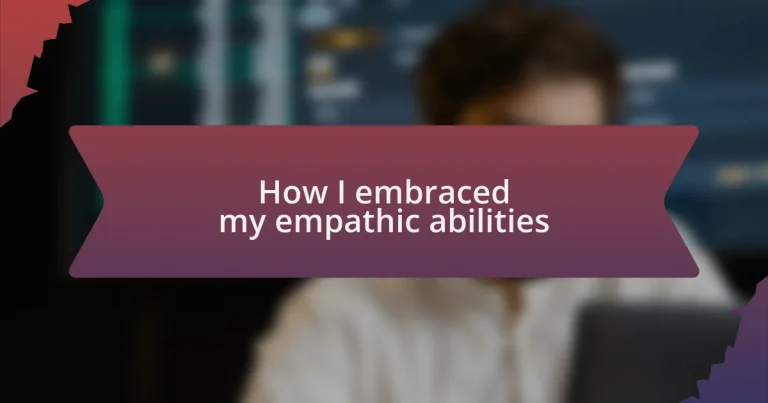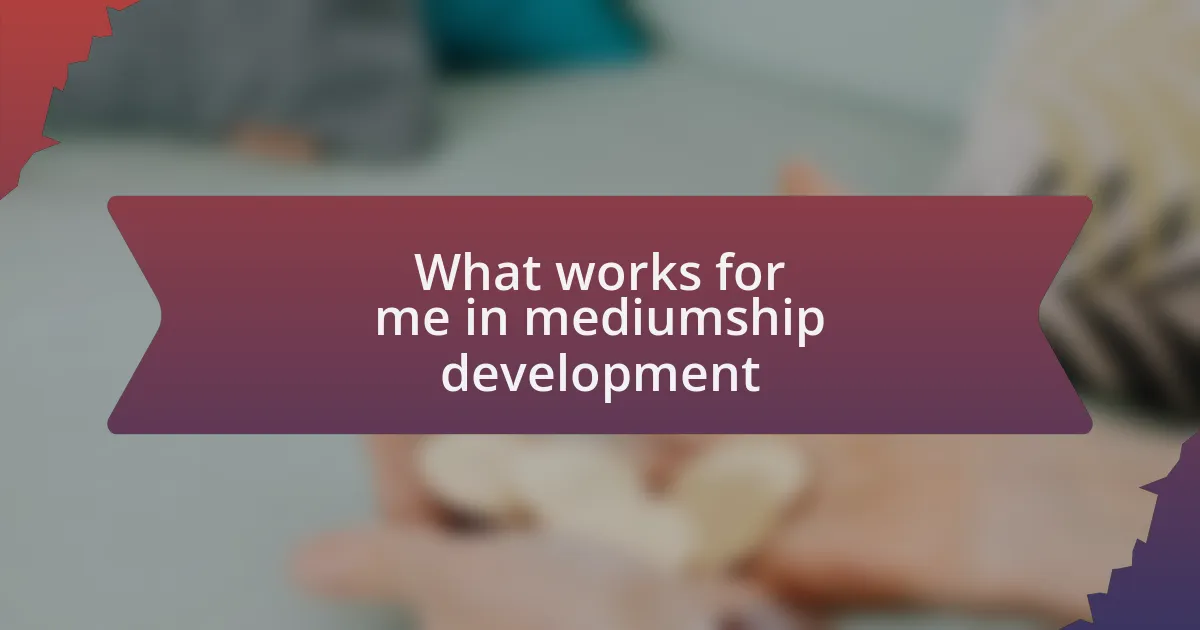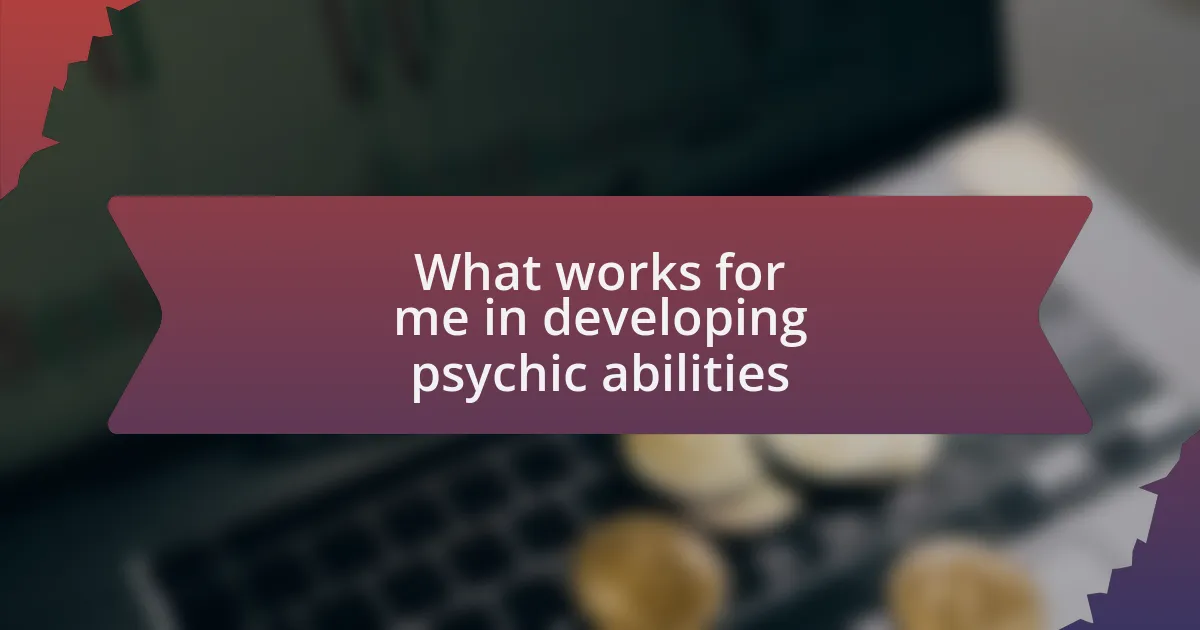Key takeaways:
- Empathic abilities involve a deep sensitivity to the emotions of others, requiring self-awareness and boundary setting to manage emotional well-being.
- Techniques to enhance empathy include mindfulness practice, active listening, and grounding exercises to regulate emotional intake.
- Sharing empathic experiences fosters community and deepens connections, highlighting the importance of mutual understanding and growth.
- Practical strategies for empaths include creating a personal sanctuary, practicing grounding techniques, and establishing clear boundaries to protect energy.
Author: Evelyn Hartman
Bio: Evelyn Hartman is a contemporary author known for her evocative storytelling and rich character development. With a background in psychology, she weaves intricate narratives that explore the complexities of human relationships and personal growth. Her debut novel, “Whispers in the Wind,” garnered critical acclaim and established her as a powerful voice in modern literature. Evelyn resides in the Pacific Northwest, where she draws inspiration from the vibrant landscapes and diverse communities around her. When she’s not writing, she enjoys hiking, gardening, and spending time with her two rescue dogs.
Understanding empathic abilities
Empathic abilities often manifest as an acute sensitivity to the emotions and energies of others. I remember sitting in a crowded café, where I suddenly felt a wave of sadness wash over me. It struck me that I wasn’t just picking up on my own feelings; I was absorbing the emotional landscape around me. Have you ever found yourself in a similar situation, feeling something you couldn’t quite explain?
Understanding empathy means recognizing it as a gift but also a challenge. I often feel overwhelmed when I cannot distinguish between my emotions and those of others. This blending can sometimes leave me drained. It made me wonder—how do we balance our own emotional well-being while being open to the feelings of the world around us?
It’s crucial to develop self-awareness to harness these abilities effectively. For instance, I’ve learned to set personal boundaries, which helps me manage the intensity of my feelings. Have you ever experienced a moment when you realized you needed to step back? That perception can be liberating, turning our empathic gifts into tools rather than burdens.
Techniques for enhancing empathic abilities
One effective technique I’ve discovered for enhancing my empathic abilities is cultivating mindfulness. By taking just a few minutes each day to meditate or breathe deeply, I create a mental space where I can better tune into both my feelings and those around me. I’ve noticed that amidst the chaos of daily life, a moment of stillness can reveal a deeper understanding of the emotions I encounter. Have you ever found clarity in quiet moments?
Another approach that has worked wonders for me is engaging in active listening. When conversing with someone, I focus fully on their words and emotions, putting aside my thoughts and responses. This practice has deepened my connections with others. I remember a conversation where, by simply giving the other person my full attention, I could sense their anxieties even before they voiced them. How often do we miss such nuances in everyday exchanges?
Grounding techniques have also proven invaluable in regulating the emotional intake I experience. Whenever I feel overwhelmed, I visualize roots extending from my feet into the earth, anchoring me. This imagery reminds me to stay centered. It’s fascinating how such a simple visualization can help keep the emotional energies at bay, directing my focus inward. Have you ever tried grounding exercises to clear your emotional slate?
Sharing experiences on empathic journeys
Sharing experiences with empathic journeys often reveals the intricate tapestry of our emotional landscapes. I recall a time when I attended a gathering and unexpectedly absorbed the collective anxiety in the room. It was overwhelming, yet it pushed me to recognize that these emotional exchanges are not just burdens; they are opportunities to connect and understand on a deeper level. Have you ever felt the weight of unspoken emotions pressing against you?
One particularly transformative experience happened during a quiet evening walk. As I strolled through the park, I sensed a little girl nearby who was playing with her mother. I could feel her joy, but also an underlying fear of losing that moment of happiness. This small insight shifted my perspective. It made me realize how often we overlook the layers of emotions hiding beneath the surface. When have you encountered a moment that unveiled hidden feelings?
I’ve learned that sharing these empathic experiences with others creates a sense of community. I once spoke with a close friend about my ability to sense their emotional state, and it opened a profound discussion. We began to explore how our own empathic journeys shaped our lives. This exchange not only strengthened our bond but also highlighted the importance of sharing our experiences for mutual growth. Don’t you think discussing our empathic experiences can illuminate paths for others?
Practical tips for fellow empaths
Navigating life as an empath requires developing strategies to protect your energy. One technique I’ve found helpful is grounding myself before entering crowded spaces. I visualize roots extending from my feet into the earth, securing my sense of self. When I do this, I often feel more centered and less overwhelmed. Have you tried any grounding techniques?
Another practical tip is to create a sanctuary—a space where you can retreat to recharge. For me, it’s my reading nook, filled with plants and calming scents. Whenever I feel an emotional overload, I immerse myself in this comforting environment. It’s a simple yet effective way to reconnect with my own feelings and step back from external stimuli. What does your sanctuary look like?
Establishing clear boundaries is crucial for empaths. I remember a conversation with a colleague who often vented their frustrations. Initially, I was drawn in, but eventually, I had to articulate my need for emotional space. Setting that boundary not only protected my energy but also encouraged my colleague to find healthier ways to express their feelings. Have you experienced a shift in your interactions by setting boundaries?





